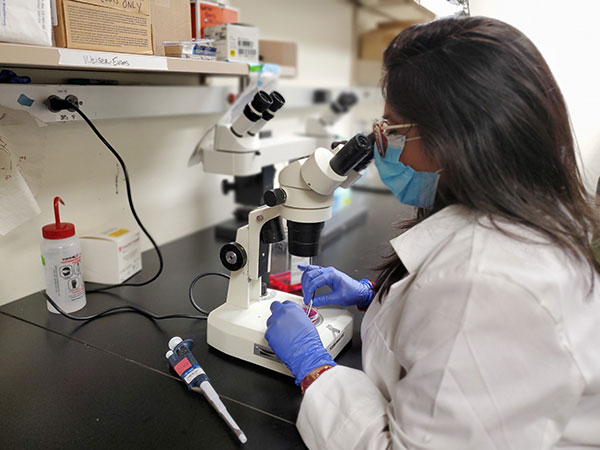Lab Overview
Katharina Hopp, Ph.D. is an Associate Professor in the Division of Nephrology and Hypertension and an Outstanding Early Career Scholar of the Department of Medicine at the University of Colorado Anschutz. Dr. Hopp obtained her Ph.D. in Biochemistry and Molecular Biology from the Mayo Clinic, Rochester, MN with a focus on Polycystic Kidney Diseases (PKD). She has been studying the pathomechanisms driving PKD for over 10 years.
PKD is a group of genetic diseases that are characterized by the development of numerous kidney cysts which progressively destroy the healthy kidney tissue and lead to organ failure. The dominant form of PKD, Autosomal Dominant PKD (ADPKD), is the most common genetic kidney disease worldwide with an incidence of ~1 in 500 people. Even more than three decades after the discovery of the predominant disease-causing genes, PKD1 and PKD2, the mechanisms that drive kidney cyst growth are largely unknown and treatment options for patients remain inadequate.
Dr. Hopp’s laboratory uses PKD animal models as well as in vitro cell/organ culture systems to identify and interrogate mechanisms that drive kidney cyst growth and may translate to novel therapeutic targets for PKD. The predominant areas of interest are (1) the functional role of immune cells within the cystic microenvironment and (2) the impact of dysregulated metabolism in driving cyst growth. The Hopp lab studies pathomechanistic paradigms and treatment approaches gained within the cancer field and applies them to PKD; PKD has been considered a neoplasia in disguise and shares many cellular and molecular parallels with cancer. In particular, Dr. Hopp’s lab researches the role immunosuppression in PKD and the involvement of T cells, macrophages and a nutrient deprived microenvironment in epithelial proliferation and kidney cyst growth or initiation.
In addition to her laboratory, Dr. Hopp is the director of Basic Research and Preclinical Core of the University of Colorado Anschutz PKD Program. The Preclinical Core evaluates targeting promising pathomechanisms therapeutically using multiple disease relevant mouse and rat models. The core also conducts preclinical studies for industry and aims to provide detailed data required for translating new therapeutics into clinical Phase 1 or Phase 2 trials.
